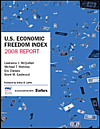As bad as the deficit woes of Arizona are – and they are very, very bad – we still have the comfort of knowing that things could always be worse.

We could be California.
On Tuesday, California voters overwhelmingly rejected five ballot propositions intended to shore up the state’s $15.4 billion budget deficit. The defeat immediately increased pressure on the state’s short-term borrowing capacity, ballooning the deficit almost overnight to more than $21 billion.
It is even worse than it appears. For the second time this year, California faces bankruptcy. It will need at least $10.6 billion to pay bills through the summer. But, this time, the cut-averse state Legislature has literally run out of funding options.
All funding options, that is, but one. Even as Golden State voters were tossing out his package of tax-increase extensions, payoffs to state teachers unions and revenue-enhancing gimmicks, Gov. Arnold Schwarzenegger was in Washington, D.C., reportedly seeking a federal bailout for his state.
California state Treasurer Bill Lockyer already has put the bailout question to his federal counterpart, Treasury Secretary Timothy Geithner. Both the governor and Lockyer also reportedly are seeking federal loan guarantees.
The very last thing California needs now is a federal pressure-release valve. California government got itself into the unprecedented mess. It needs to dig itself out. For years, California has been the nation’s leader at “soaking the rich” with the highest upper marginal personal income-tax rate in the country, according to the Pacific Research Institute.
It has the highest corporate income tax of all the Western states and the fifth-worst business-tax environment in the nation. Additionally, the cumulative effect of California’s tax, regulatory and legal climate adds another $1,180 to every taxpayer’s bill, according to the institute.
The feds already are complicit in the state’s unwillingness to rein in spending. Under pressure from the powerful Service Employees International Union, the White House earlier this month insisted California budgeters restore a 20 percent cut in wages to home-care nurses or risk losing $6.8 billion in federal stimulus funds. Exactly how that federal interference helped promote fiscal sanity on the West Coast, we cannot say.
With real-estate prices still in free fall and businesses and taxpayers abandoning the state in droves, one would think the 60 percent rejection of the ballot measures would slap the California Legislature back to reality.
Perhaps it has. “The voters have spoken, and they are telling us that government should do the best it can with the money it has,” state Senate President Pro Tem Darrell Steinberg said.
The struggle in Arizona is a desperate one. But the state does not yet face the sort of crumbling credit rating and other portents of doom facing California.
And no one here has seriously suggested we make the mistake of going hat in hand to Washington for yet another bailout.
Things could be worse – we could be California
Pacific Research Institute
As bad as the deficit woes of Arizona are – and they are very, very bad – we still have the comfort of knowing that things could always be worse.
We could be California.
On Tuesday, California voters overwhelmingly rejected five ballot propositions intended to shore up the state’s $15.4 billion budget deficit. The defeat immediately increased pressure on the state’s short-term borrowing capacity, ballooning the deficit almost overnight to more than $21 billion.
It is even worse than it appears. For the second time this year, California faces bankruptcy. It will need at least $10.6 billion to pay bills through the summer. But, this time, the cut-averse state Legislature has literally run out of funding options.
All funding options, that is, but one. Even as Golden State voters were tossing out his package of tax-increase extensions, payoffs to state teachers unions and revenue-enhancing gimmicks, Gov. Arnold Schwarzenegger was in Washington, D.C., reportedly seeking a federal bailout for his state.
California state Treasurer Bill Lockyer already has put the bailout question to his federal counterpart, Treasury Secretary Timothy Geithner. Both the governor and Lockyer also reportedly are seeking federal loan guarantees.
The very last thing California needs now is a federal pressure-release valve. California government got itself into the unprecedented mess. It needs to dig itself out. For years, California has been the nation’s leader at “soaking the rich” with the highest upper marginal personal income-tax rate in the country, according to the Pacific Research Institute.
It has the highest corporate income tax of all the Western states and the fifth-worst business-tax environment in the nation. Additionally, the cumulative effect of California’s tax, regulatory and legal climate adds another $1,180 to every taxpayer’s bill, according to the institute.
The feds already are complicit in the state’s unwillingness to rein in spending. Under pressure from the powerful Service Employees International Union, the White House earlier this month insisted California budgeters restore a 20 percent cut in wages to home-care nurses or risk losing $6.8 billion in federal stimulus funds. Exactly how that federal interference helped promote fiscal sanity on the West Coast, we cannot say.
With real-estate prices still in free fall and businesses and taxpayers abandoning the state in droves, one would think the 60 percent rejection of the ballot measures would slap the California Legislature back to reality.
Perhaps it has. “The voters have spoken, and they are telling us that government should do the best it can with the money it has,” state Senate President Pro Tem Darrell Steinberg said.
The struggle in Arizona is a desperate one. But the state does not yet face the sort of crumbling credit rating and other portents of doom facing California.
And no one here has seriously suggested we make the mistake of going hat in hand to Washington for yet another bailout.
Nothing contained in this blog is to be construed as necessarily reflecting the views of the Pacific Research Institute or as an attempt to thwart or aid the passage of any legislation.